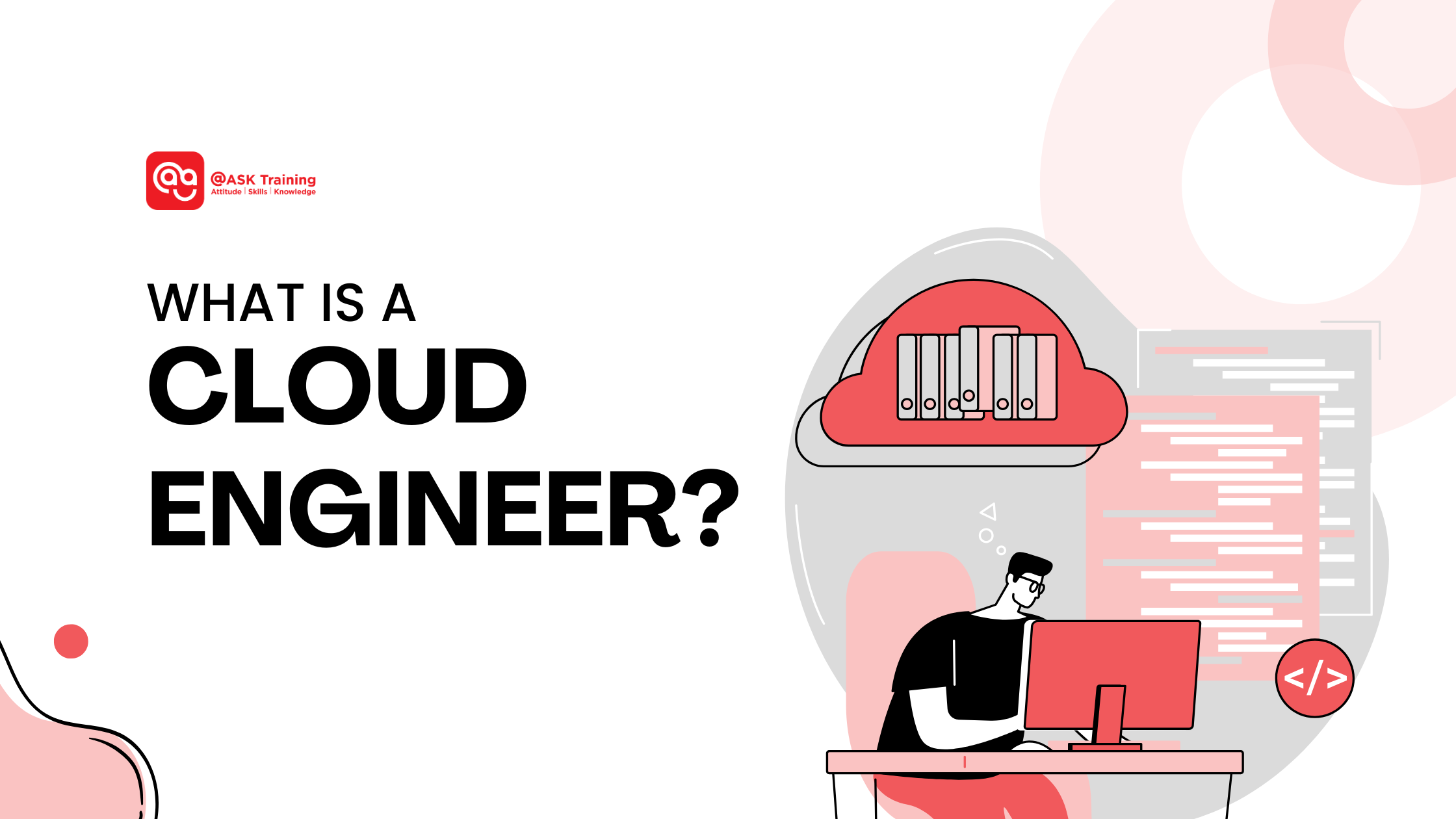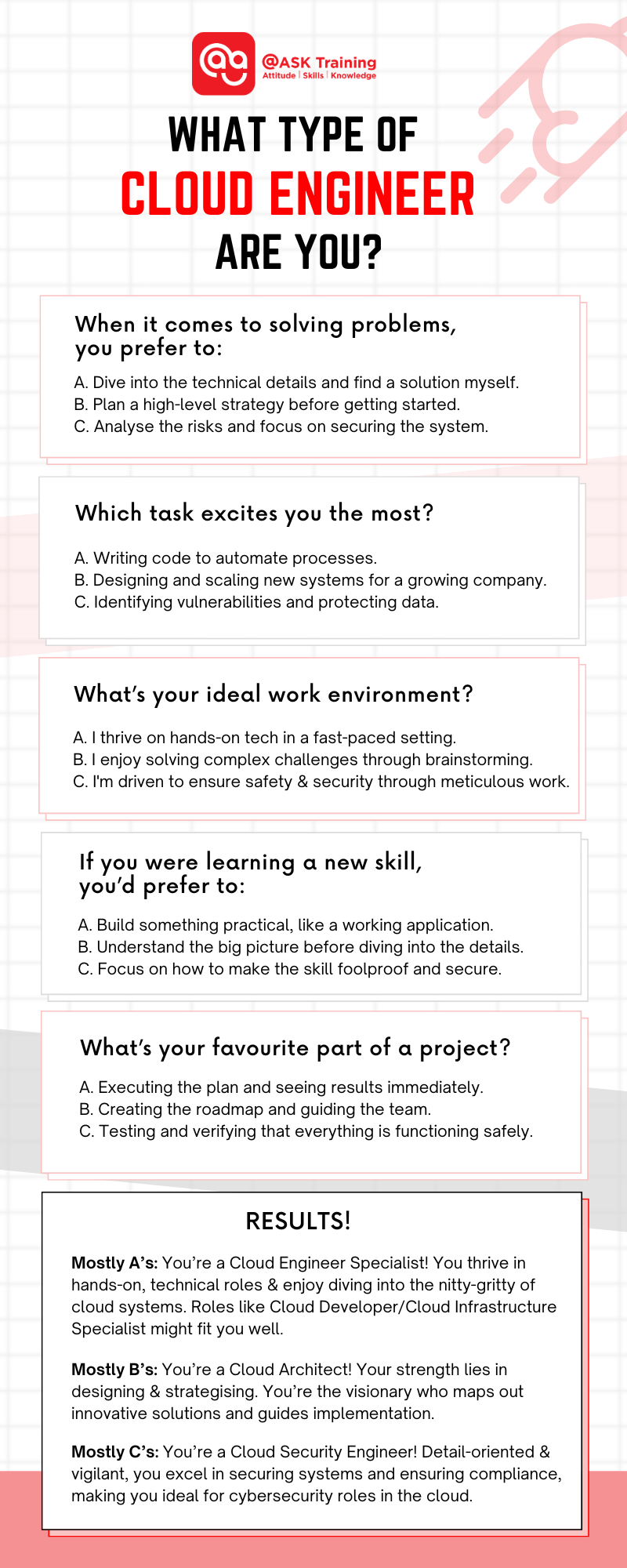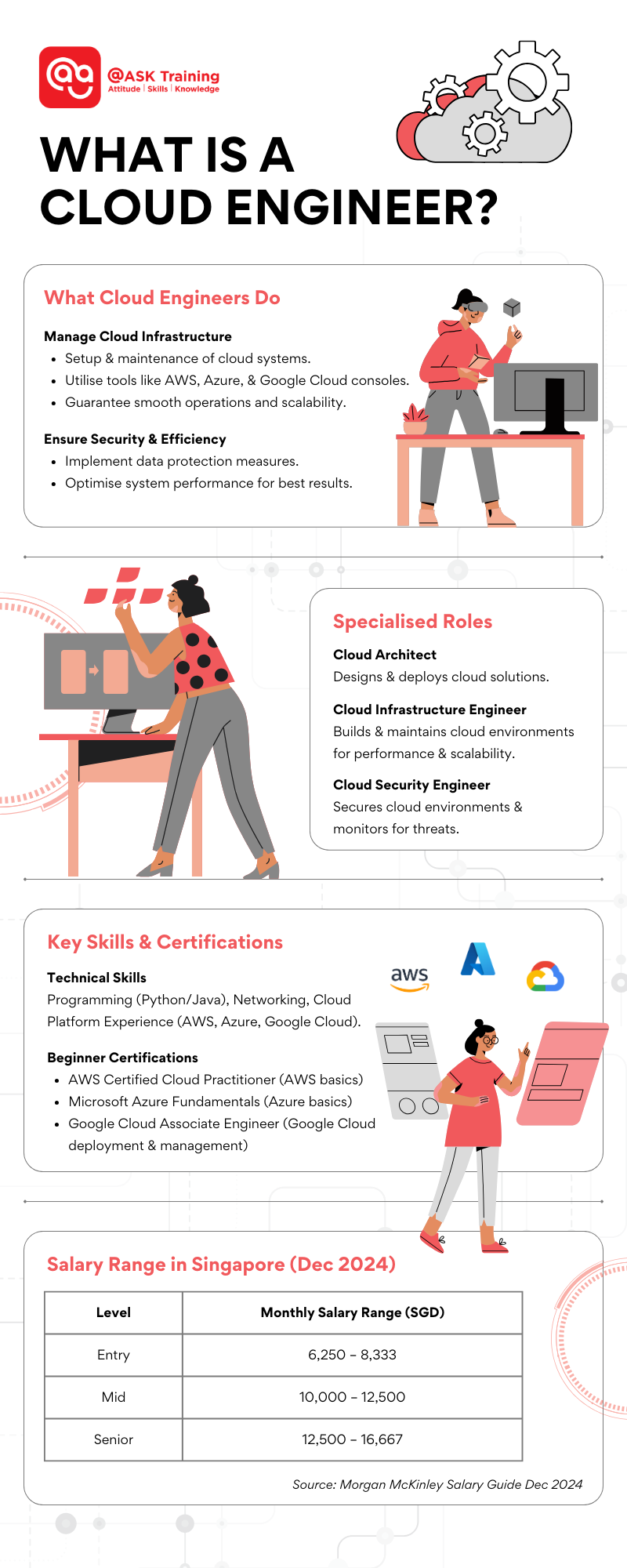
The world is moving to the cloud, and cloud engineers are leading the charge.
For example, a recent Gartner forecast report highlighted that global public cloud spending to reach $723 billion by 2025 worldwide as businesses worldwide are rapidly adopting cloud technology to enhance agility, innovation, and cost efficiency.
As businesses globally, and especially in Singapore, embrace digital transformation, the demand for skilled cloud engineers continues to soar.
Imagine being the expert who ensures Netflix streams seamlessly or Amazon’s online store runs without a hitch — that’s the kind of impact cloud engineers have.
In simple terms, a cloud engineer is an IT professional responsible for designing, managing, and maintaining cloud-based systems and services.
This article aims to guide you on how to begin your journey in cloud engineering, whether you’re a beginner exploring IT or a mid-career professional seeking to upskill or transition into this high-growth field.
Getting into cloud engineering can feel overwhelming, but understanding the core responsibilities is the first step.
What Does a Cloud Engineer Do?
Cloud engineers are the backbone of cloud infrastructure. They perform several key tasks, including:
- Managing Cloud Infrastructure: Setting up and maintaining cloud systems using tools like AWS Management Console, Azure Resource Manager, or Google Cloud Console to ensure seamless operations and scalability.
- Ensuring Security and Efficiency: Implementing measures to protect sensitive data and optimise system performance.
Beyond these general responsibilities, a detailed cloud engineer job description often highlights specialised roles such as:
- Cloud Architect: Designing and deploying cloud solutions that meet organisational needs.
- Cloud Infrastructure Engineer: A specialised role focused on building and maintaining cloud environments to ensure performance and scalability.
- Cloud Security Engineer: Securing cloud environments by implementing policies and monitoring for potential threats.
These roles form the foundation of how businesses utilise cloud technology to stay competitive in today’s fast-evolving digital landscape.
Now that you understand what cloud engineers do, let’s explore the skills and certifications you’ll need to succeed in this field.
Skills and Certifications You Need
To become a cloud engineer, you’ll need to develop both technical skills and earn certifications that validate your expertise.
Key Technical Skills:
- Programming: Languages like Python or Java to automate and build applications.
- Networking: Understanding how networks function in cloud environments.
- Familiarity with Cloud Platforms: Hands-on experience with platforms such as AWS, Azure, or Google Cloud.
Beginner-Friendly Certifications:
- AWS Certified Cloud Practitioner: Covers the basics of cloud concepts and AWS services.
- Microsoft Azure Fundamentals: Provides an introduction to Azure’s core services and pricing models.
- Google Cloud Associate Engineer: Focuses on deploying and managing applications in Google Cloud.
These certifications are designed for beginners, providing foundational knowledge to kickstart your cloud engineering journey.
Certifications like these can open doors to opportunities where you get to work with cutting-edge technologies and help businesses in Singapore innovate.
Now that we’ve covered how multi-cloud interoperability works, you might be wondering why businesses and IT professionals invest in this approach.
The answer lies in the practical benefits and opportunities it creates, which can transform both operations and outcomes.
Salary Range and Industry Growth in Singapore
Cloud engineering is not just rewarding in terms of career growth but also can be financially lucrative.
According to industry data, cloud engineering roles offer competitive compensation. Here’s an overview of the ranges for Cloud Engineers in Singapore based on data from the Morgan McKinley Salary Guide as of December 2024:
| Level | Monthly Salary Range (SGD) |
| Entry | 6,250 – 8,333 |
| Mid | 10,000 – 12,500 |
| Senior | 12,500 – 16,667 |
These figures show a broad range depending on the platform, role, and organisation, offering a snapshot of what you can expect as you grow in your cloud engineering career.
Why is the demand for cloud engineers high in Singapore, you might ask. Let’s go into the factors driving this increasing need for expertise in cloud technology:
Push for Digital Transformation
A nationwide push for digital transformation, particularly as businesses seek to enhance operations, reduce costs, and improve scalability in the post pandemic era.
This includes the adoption of smart nation initiatives, where cloud technology plays a pivotal role in powering data-drive decision-making.
Cloud Adoption Across Industries
The need for cloud engineers increases due to rapid cloud adoption across industries such as finance, healthcare and e-commerce.
For example, financial institutions are utilising cloud solutions for secure transactions and advanced analytics, while healthcare providers are using cloud technology to manage patient records and enable telemedicine.
These sections require skilled cloud engineers to design, manage, and secure their systems.
Changing Work Environments
The rise of remote and hybrid work environments directly affects the growing need for secure, scalable remote infrastructure.
As more organisations embrace remote work, cloud engineers are essential for ensuring that employees can access resources seamlessly and safely.
This growing reliance on cloud technology underscores the critical role of cloud engineers in shaping Singapore’s digital future. These trends highlight why cloud engineering is a promising field to enter.
Let’s look at how you can take actionable steps to start your journey as a cloud engineer.
How to Get Started as a Cloud Engineer
Before getting started with actionable steps, are you curious if cloud engineering is the right fit for you?
Take our quick personality quiz! Discover if you’re more suited for hands-on technical problem-solving, strategic cloud architecture, or ensuring security in cloud environments.
Getting Started
Taking the first step toward a new career can be both exciting and challenging. As you consider cloud engineering, remember that every professional started from the beginning.
With curiosity and dedication, you can develop the skills needed to excel in this field. Let’s break it down into simple, actionable steps to help you get started and stay motivated on your journey!
Step 1: Build Basic IT Knowledge
Start with foundational skills in networking, programming, and operation systems. Online platforms such as Codecademy offer beginner-friendly courses to help you get started.
Step 2: Choose a Cloud Platform
Specialise in a platform like AWS, Azure, or Google Cloud based on your interests and market demand.
Step 3: Earn Certifications
Validate your skills by earning industry-recognised certifications from established local education bodies or training providers like us, @ASK Training!
Building your skills and earning certifications will be key milestones in your journey to becoming a cloud engineer. These steps will help you gain the confidence and expertise needed to succeed in this dynamic field.
The road to becoming a cloud engineer may seem daunting, but with the right approach, it’s achievable for anyone willing to learn!
AI in Cloud Security
As cloud adoption accelerates, so does the complexity of securing vast, distributed environments. Traditional, manual security methods are no longer sufficient.
This is where Artificial Intelligence (AI) and Machine Learning (ML) are revolutionising the field, creating a high-demand niche for skilled cloud engineers.
Understanding AI in cloud security is no longer a luxury; it’s a core component of modern IT infrastructure.
The Challenges of Implementing AI in Cloud Security
While powerful, integrating AI into security strategies comes with its own set of hurdles that organisations must navigate.
1. High Cost & Integration Complexity
Merging advanced AI tools with existing legacy systems and multi-cloud environments can be prohibitively expensive and technically challenging.
2. Data Privacy and Compliance Risks
AI systems require massive datasets to learn, which can include sensitive information. Ensuring this data is handled in compliance with regulations like PDPA or GDPR is a significant concern.
For example, a bank using AI for fraud detection must carefully balance powerful anomaly monitoring with strict financial privacy regulations.
3. Shortage of Skilled Professionals
There is a critical shortage of cloud security professionals who possess the specialised skills to develop, manage, and interpret AI-driven security systems.
The Benefits of Using AI in Cloud Security
Despite the challenges, the advantages are transformative, making AI a powerful ally for cloud engineers.
1. Real-Time Threat Detection and Response
AI algorithms can analyse network traffic, user behaviour, and access patterns in real-time, identifying threats like zero-day attacks or insider threats far faster than any human team could.
This allows for automated responses, such as isolating a compromised instance within milliseconds.
2. Reduction of Human Error
By automating routine security tasks like log analysis and vulnerability scanning, AI minimises the oversights that often lead to breaches in complex cloud systems.
3. Unmatched Scalability
AI solutions can effortlessly scale to monitor and protect enormous, dynamic cloud environments, making them perfect for multi-cloud and hybrid-cloud setups.
For instance, an AI system can instantly flag a user logging in from a new country and automatically enforce multi-factor authentication (MFA) before granting access.
The Future of AI in Cloud Security
The role of AI is set to expand from reactive to truly predictive and integrated:
1. Predictive Security
AI will evolve to predict attack vectors and vulnerabilities before they are exploited, allowing organisations to pre-emptively strengthen their defences.
2. Integration with Zero-Trust
AI will be the engine that makes Zero-Trust security models practical by continuously verifying user and device identity and enforcing least-privilege access dynamically.
3. AI-Driven Compliance
Automated systems will continuously monitor cloud configurations and data handling practices against regulatory frameworks, generating compliance reports and flagging misconfigurations in real-time.
As Gartner predicts, AI-based cloud security is expected to become a standard industry practice by 2027.
How AI is Used to Prevent Data Breaches in the Cloud
AI prevents breaches through continuous, intelligent vigilance:
1. Behavioural Analytics
AI establishes a baseline of normal behaviour for users and systems. Any deviation, such as an unusual time-of-day access attempt or a massive data transfer, triggers an immediate alert and can be automatically blocked.
2. Automated Patching
AI systems can identify vulnerabilities and automatically deploy patches to thousands of instances across a cloud fleet, drastically reducing the window of opportunity for attackers.
3. Dynamic Access Management
AI enhances Identity and Access Management (IAM) by adjusting user permissions in real-time based on current context and risk level, ensuring users only have the access they absolutely need at that moment.
Who Offers the Top AI Infrastructure Services in the Cloud?
The major cloud providers are leading the charge, embedding AI directly into their security services. For any aspiring cloud engineer, proficiency in these platforms is becoming essential:
- Amazon Web Services (AWS): Offers GuardDuty for intelligent threat detection and Macie for using ML to discover and protect sensitive data.
- Microsoft Azure: Its Microsoft Defender for Cloud (formerly Azure Security Centre) uses advanced analytics and ML to identify advanced threats across cloud workloads.
- Google Cloud: Provides Google Security Operations (formerly Chronicle), a security analytics platform built on Google’s infrastructure, designed to analyse massive security data sets at lightning speed.
The demand for cloud engineers who can implement, configure, and manage these AI-driven security tools is rising rapidly, making this skillset a huge career differentiator.
Wrapping Up
Cloud engineering is a dynamic and rewarding career path. Cloud engineers play a critical role in managing cloud systems, ensuring security, and driving digital transformation.
Here are the key takeaways:
- What Cloud Engineers Do: They manage cloud infrastructure, ensure security, and optimise system performance.
- Skills and Certifications: Programming, networking, and certifications like AWS, Azure, and Google Cloud can set you up for success.
- Industry Growth and Salary: The demand for cloud engineers in Singapore is driven by digital transformation and cloud adoption, offering competitive salaries.
- Getting Started: Build foundational IT knowledge, choose a cloud platform, and earn certifications to kickstart your journey.
Ready to Take the Leap into Cloud Engineering?
Consider enrolling with @ASK Training! We offer various IT and Cloud Computing courses designed for beginners and those looking to transition careers. These IT courses provide hands-on experience and expert guidance to help you achieve your goals.
Here are some of our popular IT courses you should check out:
- IT Foundational Courses: Beginner-friendly courses in essential IT skills from troubleshooting to hardware and software management. Perfect for those starting their tech journey or looking to upskill.
- Cloud Computing Course: Equip yourself with the foundational knowledge and skills needed to navigate the cloud computing ecosystem using leading platforms like Azure.
Get in touch with us to learn more about our courses and available funding today!
Let’s start building your future in the cloud!
Related Courses
- Cloud Computing
- IT Foundations Courses
- Advanced Certificate in Infocomm Technology (Infrastructure and Operations)
◆◆◆


